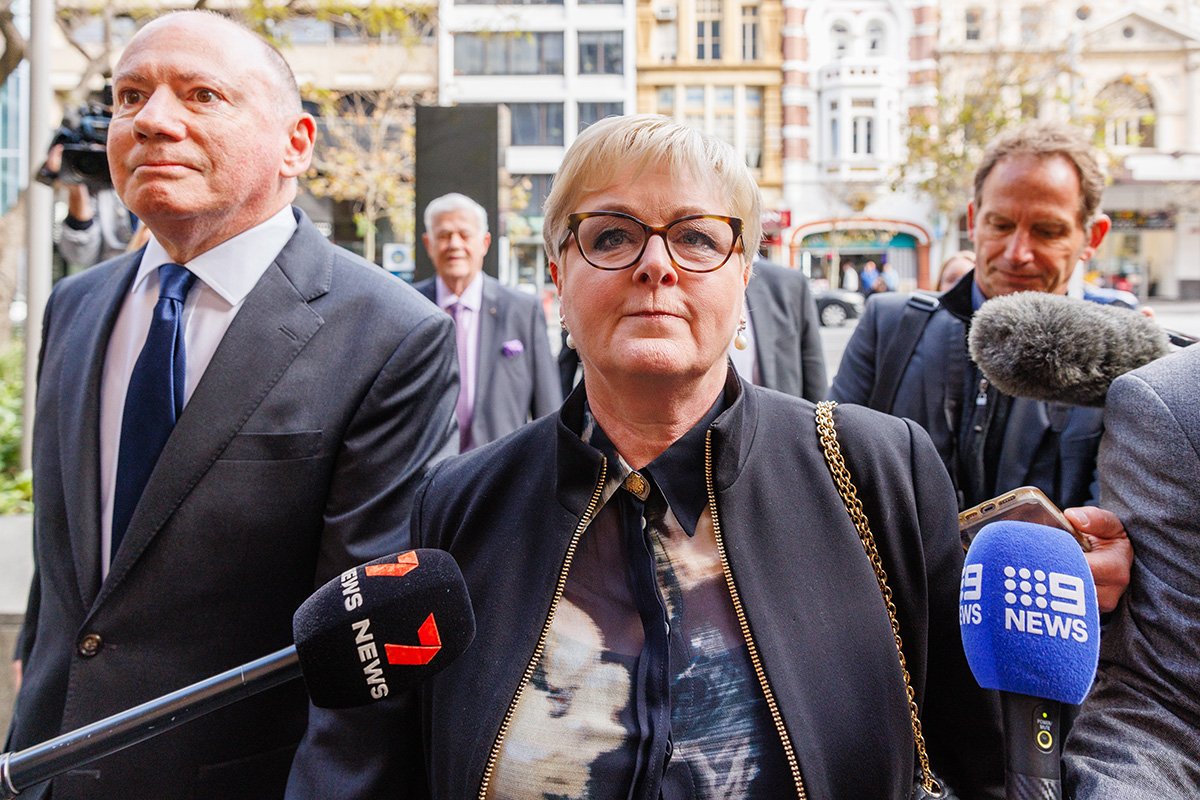Jo Dyer
The Tale of a Supportive Boss

There’s a certain kind of operative ensnared deep within the political depths who sees everything through a dark partisan prism. Any criticism levelled against them is unjustified hostility from those with malign intentions who are laser-focussed on inflicting the maximum political damage on them, their allies and all for which they stand. In this paranoid narrative, they are always the righteous ones, the innocent victims of perfidious opponents who will stoop as low as is required to bring them undone.
Enter Linda Reynolds. So convinced is she that a young rape survivor and her fiancé “agreed on a common design for the sole or dominant purpose of causing injury” to her, she has unearthed the rare action of “tortious conspiracy” and in the WA Supreme Court this week put herself centre stage as the true victim of the unholy Lehrmann mess. In her telling of this now familiar story, Brittany Higgins and her partner David Sharaz weren’t aggrieved by the Government’s failure to fulfil an employer’s duty of care for a young woman sexually assaulted in the heart of our democracy but were dastardly conspirators with Labor “dogs” in a bid to bring down Reynolds and the Morrison Government.
Taking the stand last week, a steady stream of Reynolds’ nearest and dearest detailed the great toll taken on their daughter, sister, friend and colleague from being publicly accused of failing to support a junior female employee who was raped by a more senior male employee in Reynolds’ very office. The injustice of it all! Linda is a caring woman who doesn’t deserve any of the bad publicity that had such a deleterious impact on her health, career and confidence.
What didn’t feature in the many reports out of Perth was exactly how Reynolds had supported her junior employee. There seemed precious little evidence adduced to support Reynolds’ terse claim: “It is a fact that Ms Higgins received our support”. In Reynolds’ account to the courtroom, she insisted that when she met with Brittany on April 1 she had no inkling a sexual assault may have taken place. Exactly what she knew and when she knew it has changed in the varied accounts Reynolds has given to the ACT Supreme Court, the Australian Federal Police, The Australian, Channel 7’s Spotlight and now the WA Supreme Court, but she is currently adamant that – despite now conceding she knew her staffers Brittany and Bruce Lehrmann had consumed large quantities of alcohol to the point of Brittany suffering memory loss, that Brittany had been found unconscious and semi-naked in Reynolds’ office in the early hours of the next morning after Lehrmann was recorded beating a hasty retreat, that Brittany recalled Lehrmann being “on top of her”, that her Chief of Staff Fiona Brown had given Brittany contact information for a sexual violence counselling service, that the involvement of doctors had been canvassed, and that an AFP officer had notes from a conversation with Reynolds in which Reynolds told the officer she’d learned about the rape from a Department of Parliamentary Services report received on March 27 – she had no idea when she met with Brittany on April 1 that anything untoward might have happened to Brittany on the morning of March 23. This despite Fiona Brown and other staffers telling of a heated argument on March 29 in which Reynolds instructed Brown to report the incident to the police irrespective of Brittany’s position, and Brown refused.
Despite the conflicting reports about the April 1 meeting, it is common ground between all parties that after that meeting, Reynolds never spoke to Brittany of the rape again. “You never took her aside, in a private space, to ask her ‘hi Brittany, how are you going?’”, asked Brittany’s lawyer Rachael Young in court this week. “I didn’t seek to be her counsellor.”, responded Reynolds curtly.
By Reynolds’ own account, the only “support” she offered Brittany was the April 1 meeting, which she implausibly continues to assert took place before she even knew a rape had occurred. Fiona Brown arranged for Brittany to see the police later that day, had a brief conversation with her when she returned to the office, and then Brown too never engaged directly with Brittany about the rape again. Whilst Brittany was still with the police, Brown emailed her contact at the Department of Finance to ask “if there was anything else (she) needed to do”. She was advised there was not. She spoke to an AFP Agent on April 5 and thereafter “understood responsibility for the matter was now in the hands of the police.” Her job was done. She never spoke to Brittany about it again and later, when she heard Brittany had elected not to pursue the case, decided that meant no rape had occurred.
Does Reynolds genuinely believe having one meeting with a young employee in the room where she was raped is sufficient to discharge her duty of care as an employer? A meeting which took place, on her current account, before she even knew Brittany had been assaulted? Did it not occur to her that, when she finally did learn of the crime – whenever that was – it was incumbent on her, the employer of both the victim and the perpetrator – to speak directly to Brittany and acknowledge what had occurred, and express concern, compassion and support? And if Reynolds genuinely believes such expressions of human sympathy are inappropriate from a Minister and employer, does that not reinforce Brittany’s point – the point that Scott Morrison last week gave evidence – in a mercifully fleeting but instantly soul-crushing return to the national spotlight – she raised with him in their face-to-face meeting in April 2021? That there was nowhere for a wronged employee such as Brittany to turn for HR support, and that there needed to be structural change to the conditions of parliamentary staffers’ employment via amendments to the Members of Parliament Staff Act, institutional reform that ultimately came in the form of the establishment of the Parliamentary Workplace Support Service, Brittany’s true legacy?
Furthermore if, as Reynolds says, she has “never questioned Ms Higgins’ account of her sexual assault… I believe her”, by what metric does Reynolds think “supporting” a victim of rape includes attempting to collude with her rapist’s lawyers during his trial? Because if we know Reynolds did almost nothing to support her employee in the days, weeks and months after the rape, we know too of a few things Reynolds incontrovertibly did do in the aftermath of the Project story going to air, namely:
- called Brittany a “lying cow” during a meeting with her staff;
- cultivated a familiar texting relationship with Lehrmann’s lawyer Steve Whybrow that, despite being in Rwanda at the start of the criminal trial, saw her send him (a) tips for his questioning of specific witnesses and (b) “catty” comments about Brittany;
- sent her Perth-based husband to observe Brittany give evidence during Lehrmann’s Canberra criminal trial;
- leaked private and confidential Government documents about Brittany’s settlement to a columnist infamous for her incessant venomous attacks on Brittany;
- referred Brittany’s settlement to the NACC and gave interviews about doing so.
Coincidentally all the above are the things Brittany alluded to in the July 2023 Instagram post for which Reynolds is now suing. Reynolds has acknowledged all of them occurred.
Throughout her time in the witness box, it became clear just how angry Reynolds had been in the period after Brittany’s story went public. She was angry with Labor Senators about the way they questioned her handling of the rape during Question Time (and was prepared to invoke the name of the now dead Kimberley Kitching in her defence despite contemporaneous documentary evidence from Kitching refuting Reynolds’ account). She was angry about the outfits Brittany wore to Lehrmann’s criminal trial. She was angry at Mark Dreyfus for excluding her from the mediation session that resulted in Brittany’s settlement. She was angry at Peter Dutton for her demotion from the Front Bench after the election. Notably – apart from her choice of attire – Brittany was directly responsible for none of these enraging incidents. But, of course, if Brittany hadn’t been raped, or if she’d kept her story to herself, or if she’d accepted that one tense meeting held at the scene of the crime was sufficient support for an employer to offer the victim of a workplace crime, then maybe none of the distressing events that happened thereafter would have occurred.
In a bid to prove she was sufficiently supportive of her rape survivor employee, Reynolds is suing her rape survivor employee. She was unmoved by the conciliatory statement and apology Brittany proffered at the conclusion of Lerhmann’s defamation case. She is oblivious to the fact Brittany is now pregnant with her first child. She is unconcerned by Brittany’s mental health challenges that have led to suicidal ideation and hospitalisation. She is indifferent to Brittany’s ongoing trauma resulting from the rape itself. She is suing Brittany despite all the things about which Reynolds is so enraged having happened well before the July Instagram post on which her action is based and, whilst Reynolds’ may believe that her actions as described by Brittany in her post are all completely justified, an outsider may view them as falling well within any reasonable definition of harassment, being undertaken by a thwarted politician hellbent on finding a scapegoat for her own failings, and intent on revenge.
This devastatingly ill-judged lawsuit seems further evidence of that.






